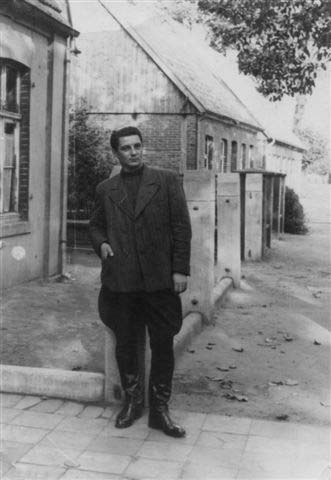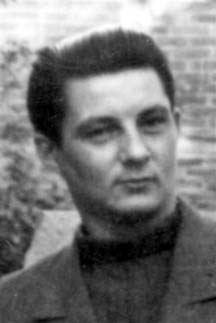Displaced Persons -DP Camps, Münster, Muenster Münster, or Muenster / Westphalia, (sometimes written as Munster), N. Rhine-Westphalia, British Zone. 4 DP Camps in June 1945:
Camp V1, army barracks at Hoher Heckenweg, (former POW camp Stalag VI F), closed in July 1946.
Camp V3, army barracks in Gremmendorf, closed in August 1945.
Camp V9, schools, private houses and army huts in Mecklenbeck, closed
November / December 1945.
Camp V20*, wooden huts in Mecklenbeck (former civil workers camp),
closed November/December 1945. See below for story.
In April 1947, a DP camp was reopened in the army barracks at Hoher Heckenweg (now renamed Portsmouth barracks) as a Regional Processing Centre for the British "Westward Ho!" scheme (recruitment of DPs for work in Great Britain). In August 1947 the barracks became the Zonal Transit Camp for this operation. About 60,000 DPs passed through this camp on their way to Great Britain. In June 1949, after the end of Operation "Westward Ho!", IRO resettlement of Displaced Persons to Australia, Chile and France was organized in this camp by 52 DPACS (Displaced Persons Assembly Centre Staff). About 10,000 DPs passed this camp on the way to a new home. Besides this transit part of the camp, a static part existed until its closure in November 1950.
In August 1948, a DP camp was opened in the army barracks at Dreizehnerstrasse (named Lincoln barracks). Some Polish DPs from Haltern came with the British relief team 18 DPACS. This new camp housed about 1,300 mostly Polish DPs in 1949 and was closed in January 1951.
Between April and June 1949 a third DP camp was established in the army barracks at Grevener Strasse 69 (named Colchester/Plymouth barracks). This camp housed 300-800 mostly Polish and Baltic DPs in 1949. The camp was also used as a Zonal Clearing House for special cases amongst the DPs of the British Zone.
In June 1950, the care for the DPs in the camps was assigned to the German administration. Only the Zonal Clearing House remained under British supervision. The camps were renamed "Wohnstaette fuer Auslaender", but the character of the quarters did not change much.
From June 1950 to December 1951, the number of DPs in the city of Muenster diminished from 4,500 to 700 because of resettlement and by vacating the camps. Only the so-called "hard core cases" remained: about 200 old and ill people, often addicted to alcohol or mentally ill. The last camp, Grevener Strasse 69, finally was dissolved in 1966.
9/16/2015 RE: V20 camp
Here is some information provided by my grandmother (Betty Jones then, now Betty Carter), who was the English commandment at V20. She currently resides in Taunton, Somerset, United Kingdom.
Camp V20 was used Aug 1948 - Sept 1950 for Operation North Sea, initiated by the U.K. Ministry of Labour and run by the Manpower Division of the British Allied Control Commission for Germany. Young displaced persons in Germany over the age of 18 years (17 if with parents consent) were permitted to volunteer for work in the U.K. on a contract of two years, in certain essential occupations. These included hospital, factory and domestic work in certain categories.
An additional use of the camp enabled authorised elderly and also very young relatives, to join persons of various nationalities already resident in the U.K.
A small side-track of the railway ran to the edge of the woods and those refugees and the young women were then aided on their journey to London. There they were given instructions and their tickets for destinations all over the U.K.
Their stay in the camp normally lasted five days, enabling medical and other tests to be made, and also some simple teaching given about the new life ahead. (Very few had any useful knowledge of the English language).
The camp was run by an English commandant aided by forty or so German staff. She now, in 2015 supplies this information.
Charlie Carter
European Archives: http://councilforeur
City archive: Stadtarchiv Münster
Hörsterstrasse 28
48127 Münster
Tel: 02 51 - 4 92 47 01
Fax: 02 51 - 4 92 77 27
http://www.muenster.de
State archive: NW Staatsarchiv Muenster,
Bohlweg 2,
48147 Muenster,
Tel.: +49 251 4885-0
Fax: +49 251 399250-100
E-Mail: stams@lav.nrw.de
Landesarchiv NRW Technisches Zentrum
An den Speichern 11
48157 Münster
Tel.: +49 251 620650-0
Fax: +49 251 399250-50
E-Mail: tz@lav.nrw.de
Archiv- und Sammlungsgut zur Zwangsarbeit in Deutschland
Call for papers:
Kontakt: Annette Hennigs, Tel. 0251 / 4885-132
Prof. Dr. Wilfried Reininghaus, Tel. 0251 / 4885-135
e-mail: tz@lav.nrw.deannette.hennigs@stams.nrw.de
poststelle@stams.nrw.de poststelle@stams.nrw.de
http://www.hclist.de
http://www.mv-data.de/mv-data.pdf
Nationalities in camp: Mostly Russians (which could mean Ukrainians), Polish, Italians, French, Netherlanders, Belgians and Others: Pie chart showing population breakdown of DP camp residents in Greven /text in German
University; Die Universitäts- und Landesbibliothek Münster / in German
"Leaving Holland" by Andrew Dettre, andrew.dettre@bigpond.com a personal account of his visit in Muenster dp camp
Dear Olga,
I have just found this page on the web. Do you have any pictures available from Grevener Str. 69? My parents used to live there between 1949-52 or 53. I just want to find how it was looked. What is there today?
Grevener Str. 69 was in Munster, former barracks in the British Zone. My father was a lawyer, graduated at that time, worked as a cook for the British soldiers. My mother was a graduated dentist in Munster. They used to remember a lot about that time. My father died 3 years ago . My mother is alive and often remembers about different people they lived with. Most of them were Polish origin, some Serbs, Croatian. They came back to Bulgaria in 1956-57 after deciding not to immigrate to Australia, nor Canada. I travel very often and tomorrow will be in Dusseldorf, just 120 km from Munster but will not have chance to pass there. Maybe next time in Germany. Thank a lot and best regards. Dimitar Penev / Bulgaria
Reply: You may find about 1500 photos at the
UN Archives, New York and at the National Archives and Records Administration,
Archives II, College Park, Maryland, USA. You may also find some in the collections
of the Imperial
War Museum, London.
DP-Camp-Wildflecken Guestbook
Stefan Schroeder, Stadtarchiv Greven.
Dear Olga,
We have been searching the internet for my father and came across
your valuable site. My name is Natasha Elms. I was born in Greven
in or near a DP camp. All I know of my father is what my aunt
told me. His name is Janek Denisewicz or Denisiewicz.
I have 3 photographs of him, from what I was told he was born
in or near Krakow. After
the war he worked at "Lager
Munster" Westphalia for the M/office IRO either for the
British or Americans. Later he migrated to America or Canada.
My godfather, W. Borek, knew my father and the last known address
that have of him is 106 Wilkesbarre 18 New York. I would love
to know if you could help me locate or tell me anything about
him. I have wondered all my life. Thank You so much. Natasha /
New Zealand. My present email address is remcrone@paradise.net.nz
Good new! reunion with new family happened in 2008.

Natasha's Father

Natasha's Father
11/28/04 I have just seen your website and am interested in tracing the movements of my father during the war 1939-45. His name was Stanislaw Sulich, he was in the Polish army 1936-39.The address of last residence outside of UK was Munster camp, Germany. Could you help in finding out more information. Best regards. Tadeusz. / UK
3/7/05
Your help and ideas will catapult my search. Your site is great and thank you so much for your help....going out of your way for a complete stranger even by answering my request, shows only that you are truly a good person.
My grandfather was sent to what I belive is an area (camp) called Munsterlager. I think it may be by Soltau. His name was Osyp (Joseph) Panchyshyn, and was sent there somewhere between 1943-1945, at about 18-22 years of age. There he met my GrandMother Elizabeth Choban, both of them are of the Ukrainian Heritage. Are there lists of occupants of these camps, or how do I even figure out what camp they were in? Thank you for any help you or your readers can provide. With Kindest Regards..... Andrew Panchyshyn / Canada
3/9/06 Dear Olga
I just wanted to let you know about the publication of my Ph.D. thesis (in German language only). My thesis is focusing the Münster area (including nearby Greven and Reckenfeld too). For more information just use the following urls:
http://www.lwl.org
http://www.lwl.org
City of Greven, Fachdienst Allgemeiner Service, Stadtarchiv (City Archive)
www.greven.net
Dr. Stefan Schröder
Email: stefan.schroeder@stadt-greven.de
Rathausstr. 6
D-48268 Greven
Germany
2/16/2017 Hello!
Found some info in case you can add to your very amazing site. Ukrainian Autocephalous Orthodox Church parishes in the Displaced Persons Camps in Munster-Lager and Fallingbostel, Germany, including official correspondence, sacramental records, relief aid distribution records, and a remarkable DP camp census list.
https://www.ukrhec.org
Dianne Melnyk diannamelnyk@hotmail.com